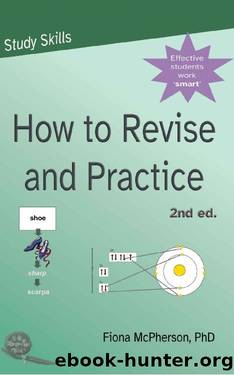How to revise and practice by Fiona McPherson

Author:Fiona McPherson [McPherson, Fiona]
Language: eng
Format: epub
Tags: Education, study skills
ISBN: 9781927166642
Publisher: Wayz Press
Published: 2020-11-05T23:00:00+00:00
Feedback
Feedback has two main roles in practice: monitoring, and motivation. Letâs talk about motivation first.
Do I need to say that motivation is important? Sometimes we dismiss motivation as if itâs a luxury, a non-vital factor that only comes into play when the individual lacks the self-discipline to do what they know they should do. But âmotivationâ has to do with having a âmotiveâ, and a âmotive forceâ is a force that makes things move. It is motives that drive our actions, and motivation is vital to actions and to practice. Itâs not simply about giving someone money, or a treat, or a gold star.
Motivation is about having a goal, and being able to maintain that goal.
Feedback is a factor in providing motivation because it can help you stay committed to your goal. It can also cause you to discard your goal, to give up. Itâs crucial, therefore, to get feedback right.
In the context of motor skill learning, feedback is generally concerned either with the outcome of the action or the quality of the action. It may be explicit (such as your coach or teacher telling you exactly what you did wrong) or implicit, inherent in the action itself (if youâre aiming at a target, or if youâre trying to sink a putt, itâs obvious how well youâve done).
Implicit feedback is less potentially dangerous than explicit feedback. You may decide to give up because youâre not doing as well as you think you should, but thatâs a problem of your expectations and goal-setting, rather than a problem inherent in the feedback. Implicit feedback is vital for good self-monitoring. Explicit feedback, on the other hand, is more problematic. When we think of feedback as a de-motivator, itâs generally external feedback thatâs the problem.
Research indicates that, in the context of skill learning, negative feedback â feedback about errors, or feedback telling you that youâre not doing as well as your fellow students â can worsen performance. However, feedback telling you that youâre doing well (regardless of its accuracy), improves performance.
Itâs suggested that one reason why negative feedback might hamper skill learning is that it increases thoughts of âselfâ. This comes back to the third phase of skill learning â the aim is to remove consciousness from the process. When youâre thinking about your self, when youâre fretting over your performance and thinking about exactly what your body is doing, youâre standing in the way of the proper performance of the skill.
If your coach, teacher, or fellow-students are overly critical, therefore, you might find it helpful to either:
change them for more supportive people!
try to convince them that negative feedback is counterproductive, or
find some occasions to practice without them.
Download
This site does not store any files on its server. We only index and link to content provided by other sites. Please contact the content providers to delete copyright contents if any and email us, we'll remove relevant links or contents immediately.
Cecilia; Or, Memoirs of an Heiress — Volume 1 by Fanny Burney(31326)
Cecilia; Or, Memoirs of an Heiress — Volume 3 by Fanny Burney(30929)
Cecilia; Or, Memoirs of an Heiress — Volume 2 by Fanny Burney(30886)
The Lost Art of Listening by Michael P. Nichols(6465)
We Need to Talk by Celeste Headlee(4863)
Asking the Right Questions: A Guide to Critical Thinking by M. Neil Browne & Stuart M. Keeley(4567)
On Writing A Memoir of the Craft by Stephen King(4206)
Dialogue by Robert McKee(3576)
I Have Something to Say: Mastering the Art of Public Speaking in an Age of Disconnection by John Bowe(3513)
Pre-Suasion: A Revolutionary Way to Influence and Persuade by Robert Cialdini(3404)
Elements of Style 2017 by Richard De A'Morelli(2940)
The Book of Human Emotions by Tiffany Watt Smith(2767)
Good Humor, Bad Taste: A Sociology of the Joke by Kuipers Giselinde(2555)
Name Book, The: Over 10,000 Names--Their Meanings, Origins, and Spiritual Significance by Astoria Dorothy(2488)
Fluent Forever: How to Learn Any Language Fast and Never Forget It by Gabriel Wyner(2442)
The Grammaring Guide to English Grammar with Exercises by Péter Simon(2391)
Why I Write by George Orwell(2355)
The Art Of Deception by Kevin Mitnick(2295)
Don't Sleep, There Are Snakes by Daniel L. Everett(2213)
